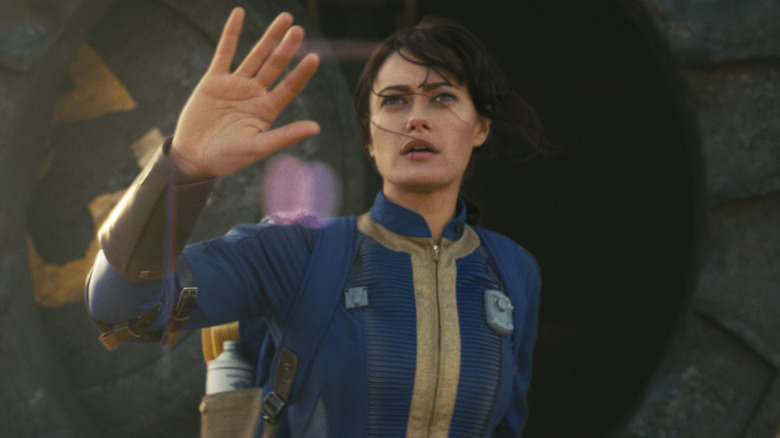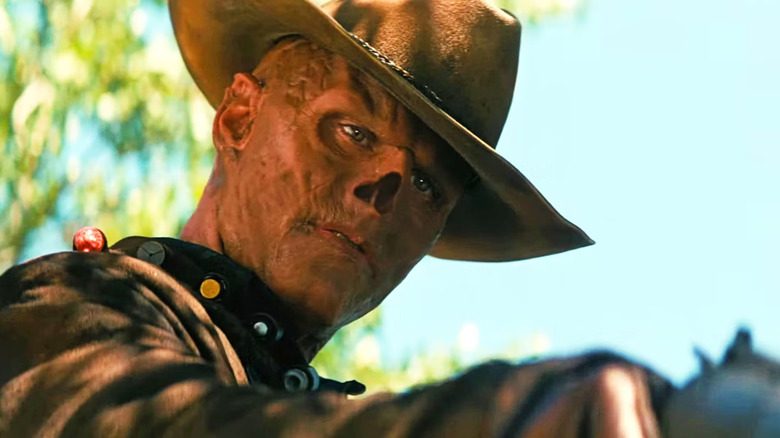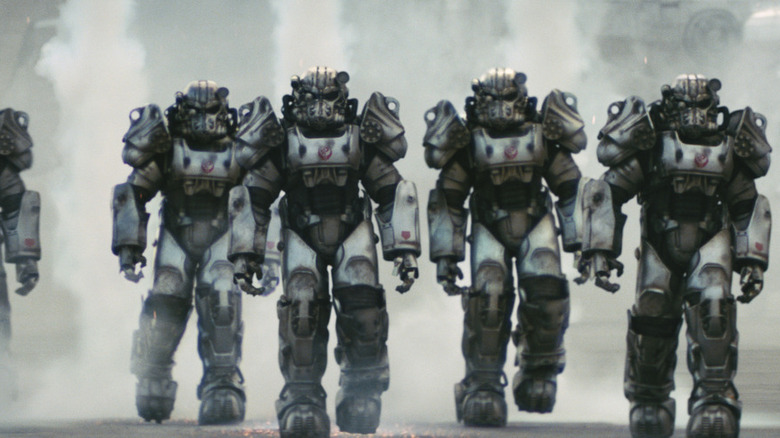Fallout Review: A Stellar Video Game Adaptation
"Fallout" avoids the big flaw of most video game adaptations by throwing away the plot and instead focusing on letting the audience live in this fantastical world. It doesn't mess with the games' storylines, it doesn't contradict player agency, and it just lets "Fallout" be "Fallout."
Indeed, the true star of the show isn't Walton Goggin's hot ghoul or Ella Purnell's vault dweller, but the production design. The world of "Fallout" feels as big and detailed as "Foundation" or "Rings of Power," while still feeling as desolate as "The Last of Us." The show has a unique atom-punk retrofuturism style that somehow combines robots and Bing Crosby. The story takes place over 200 years after nuclear war destroyed the planet, with a small percentage of the population surviving by hiding in underground vaults. Every part of the show feels tactile and lived-in, from the robots to the ruined buildings and the vaults, and even smaller details like the Nuka Cola machines and the weapons — this is "Fallout" brought to life.
Though it takes place centuries after nuclear armageddon ended civilization, this is not a somber "The Last of Us" story, though it is still about humans acting as monsters. Instead, "Fallout" has more in common with the cartoonish insanity of "Mad Max," and the poignant humor of "Dr. Strangelove." A big part of this is the music, which echoes the Jazz and Space ages of the '40s and '50s. The show incorporates a lot of songs from the game, which gives it a distinct sound that's unlike any modern TV show — really, what other big-budget show has The Ink Spots' "I Don't Want to Set the World on Fire" or Nat King Cole's "Orange Colored Sky" as major music moments?
Crawl out through the fallout, baby
The plot of "Fallout" involves three separate storylines. We have Ella Purnell's Lucy, a vault dweller searching for her father; Aaron Moten's Maximus searching for a device for his Brotherhood of Steel; and Walton Goggins' The Ghoul searching for a bounty. These eventually merge, with the three people all after a MacGuffin that can grant any of the many factions in the wasteland control over it.
Much like the games, part of what makes "Fallout" fun is the juxtaposition between the dark, depressing state of the world and its cartoonish violence and grim comedy. This is a place where everyone wants to kill you and/or eat you, where ghouls roam the wasteland, but also where giant radroaches and monsters with fingers for teeth try to kill you.
"Fallout" is in an interesting position as an adaptation. It isn't "The Last of Us" and its carbon copy remake, or even "Castlevania" and "Arcane" which have original stories using their games' characters. Instead, both characters and story are wholly original here, even if there are plenty of nods to the games. Characters like The Ghoul share elements with Hancock from "Fallout 4," while the story of the MacGuffin that drives the plot works similarly to the water purifier in "Fallout 3." This results in the season feeling like another game in the series, one that is familiar to players of the first games because war never changes, while also being fresh and new.
The show also adds its own twist to the lore of the games. Sure, some purists may scoff at the changes, but they make for a fascinating take on the source material because they fit the tone, and they supplement the adaptation's main themes of class tension and the culture of division.
Flash, bam, alakazam
Unlike the games, which are in the first person and take place after the war that destroyed the world, the "Fallout" series takes us to the beginning — when nuclear armageddon was a fear rather than a reality. The show takes that opportunity to expand on the Cold War-like paranoia and hatred that was going on before the bombs dropped, showing the rampant capitalism that was present and the culture that allowed a few companies to own everything. By portraying a future that looks like the past, "Fallout" pulls a "M*A*S*H" and tackles modern politics without actively preaching to the audience. Even a few thousand nukes can't change the awfulness of humanity and its addiction to control and power at the expense of others.
A way the show achieves this is by expanding the role and history of Vault-Tec and the vaults themselves, which leads to some fascinating additions to the lore. Unfortunately, the splitting of the narrative into three concurrent storylines (plus the flashbacks) leads to the first couple of episodes feeling disjointed and overstuffed. Thankfully, however, the second half is much better at handling its multiple stories.
By the end of the first season, "Fallout" teases an even bigger story with more ties to the games, and in a fair world, they'd be able to do it. This is a stunning adaptation that understands the best parts of the "Fallout" games and how to translate them to a new medium.
/Film rating: 8 out of 10
"Fallout" premieres on Prime Video on April 11, 2024.


